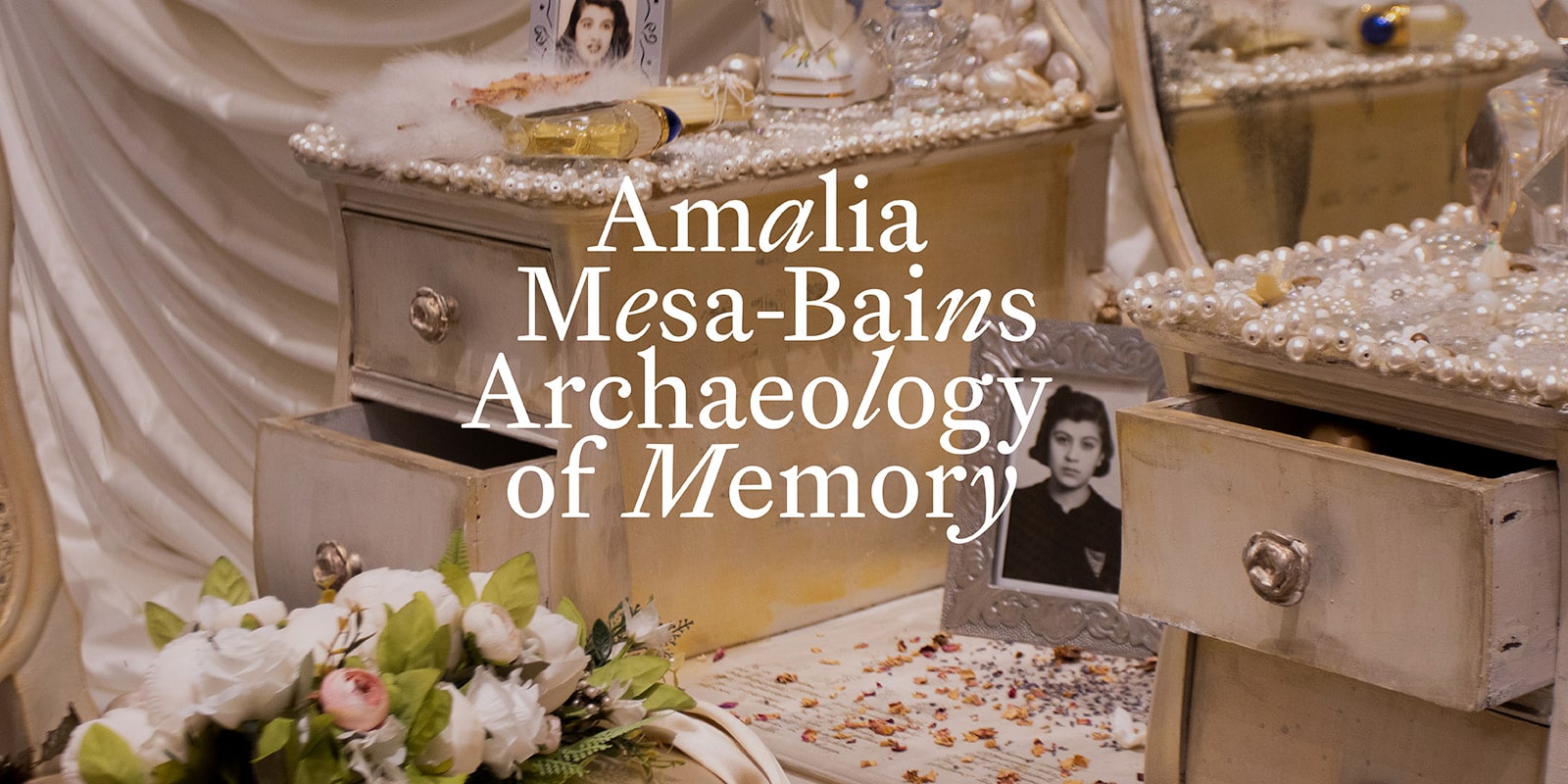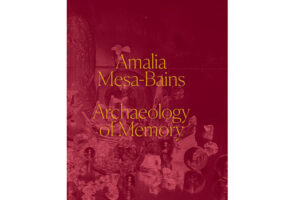El Museo del Barrio presents Amalia Mesa-Bains: Archaeology of Memory, the first retrospective exhibition by the pioneering artist, curator, and theorist. Born in 1943 to a Mexican immigrant family, Mesa-Bains has been a leading figure in Chicanx art for nearly half a century. Her practice explores intersectional feminist themes, environmentally centered spirituality, and cultural diversity to counter the racist and gendered erasures of colonial repression. The exhibition features over 40 works including the artist’s large-scale “altar-installations”, as well as prints, artist books, and codices. Anchored by the multi-chapter “Venus Envy” series, Archaeology of Memory is a rare opportunity to view three decades of Mesa-Bains’s genre-defying artworks, many of which are on display together for the first time.
El Museo del Barrio is the only East Coast venue to host the traveling retrospective, which is organized by the Berkeley Art Museum and Pacific Film Archive in collaboration with the Latinx Research Center (LRC) at UC Berkeley. The presentation at El Museo expands on Mesa-Bains’s longstanding association with the institution, where her work has been exhibited since the 1990s. Most recently, her art and critical writing served as the direct inspiration for the acclaimed 2022 exhibition DOMESTICANX, an intergenerational Latinx group presentation that expanded on Mesa-Bains’s ground-breaking theory of domesticana.
In the mid-‘70s, Mesa-Bains’s research in Mexican ancestral traditions led to her groundbreaking reimagination of sacred forms—altares (home altars) and ofrendas (offerings to the dead)— through a contemporary lens as installation art. In the following decades, the artist expanded her altar-based practice, converting domestic furniture such as a desk, table, armoire or vanity into places of devotion and memory. Subsequently, Mesa-Bains began to consider spaces at the intersection of the private and public to explore the lives of female figures from historical and religious contexts, including Mexican nun and intellectual Sor Juana Inés de la Cruz and La Virgin de Guadalupe. These sites, which include a library, harem, garden, and laboratory, provide the settings for Mesa-Bains’s archeological inquiry into women’s histories and their colonial erasure.
Mesa-Bains’s groundbreaking developments are showcased in the multi-part Venus Envy series, created between 1993 and 2023 and on view in four galleries of El Museo del Barrio. Archaeology of Memory marks the first time that Venus Envy is being shown in its entirety, having originally been staged in four chapters across different institutional settings, including the 1993 Whitney Biennale; Williams College Museum of Art; the Bernice Steinbaum Gallery; and the Menil Collection. Riffing off Freudian terminology, Mesa Bains’s title is suggestive of women’s empowerment throughout history. Other installations speak to the experience of migration, women’s solidarities, and ancestral knowledge in order to reclaim the histories that have been absented from public memory through the patriarchal institutions of nation, religion, and museum. These large-scale pieces are complemented throughout the exhibition by works on paper that illuminate the artist’s aesthetic of textual and image-based layering and excavation in two-dimensional form. Drawing on familial histories, personal experiences, and artistic legacies, these prints, handmade books, and codices inform Mesa-Bains’s conceptual practice and serve as maps for her artistic trajectory.
ABOUT AMALIA MESA-BAINS
Amalia Mesa-Bains’s work is in the collections of leading art institutions, including the Museum of Fine Arts, Houston, TX ; National Gallery of Art, Washington, D.C.; San Francisco Museum of Modern Art, CA; Smithsonian American Art Museum, Washington D.C.; and Williams College Museum of Art, Williamstown, MA; and has been shown at the Museo de Arte Contemporáneo Carrillo Gil, Mexico City, Mexico; Biblioteca Luis Angel Arango, Bogota, Colombia; Contemporary Exhibition Center of Lyon, France; El Centro de Arte Contemporáneo de Santa Monica, Barcelona, Spain; and Kulturhuset Stadsteatern, Stockholm, Sweden.
Mesa-Bains is a distinguished author, curator, and educator who holds a Ph.D. in clinical psychology from the Wright Institute in Berkeley. She has been the recipient of numerous international awards throughout her career, among them, the prestigious MacArthur “Genius” Grant in 1992. She is the first and thus far the only Chicana visual artist bestowed the honor.
Beginning in the ’60s, Mesa-Bains became a leader in the movement that sought recognition of Chicanx history in the United States, and a tireless voice in advancing that movement through education, advocacy, critical writing, and most significantly, through her own practice that created a visual archive of Chicanx life. In the late ‘70s, as part of her dissertation at the Wright Institute, Mesa-Bains interviewed 10 Chicana artists of her generation about their lived experiences, art-making, and the influence of culture on their identities. In the following decades, she continued her work to increase the visibility of Chicanx and Latinx artists, as an author contributing early scholarship to the field, and as a curator.
Mesa-Bains’s influence on a younger generation of artists specifically and on the broader Latinx community is evident in her curatorial and outreach projects. At her request, the exhibition of her work at the Whitney Museum of American Art in 1993 was augmented by a partnership with a school serving recent Latino immigrants. At San Francisco’s Galeria de la Raza, she created a training program to empower a new generation of Chicanx intellectuals to direct that institution’s programming. Amalia Mesa-Bains: Archaeology of Memory is organized by the Berkeley Art Museum and Pacific Film Archive in collaboration with the Latinx Research Center (LRC) at UC Berkeley.
The show is curated by Maria Esther Fernández, Artistic Director, The Cheech Marin Center for Chicano Art & Culture of the Riverside Art Museum and Laura E. Pérez, Professor of Chicanx, Latinx, and Ethnic Studies and Chair of Latinx Research Center, UC Berkeley. The exhibition is made possible by generous lead support from the Henry Luce Foundation and The Andy Warhol Foundation for the Visual Arts.

El Museo del Barrio’s presentation is organized by Susanna V. Temkin, Curator, with Chloë Courtney, the Marica and Jan Vilcek Curatorial Fellow. The presentation is made possible by the Mex-Am Cultural Foundation, with additional support provided by Tony Bechara, Juan Domingo Beckmann, Estrellita and Daniel Brodsky, Agustín Coppel Luken, Craig Robins, Stanley Stairs, and Maestro Dobel Tequila. Public support is provided by the New York City Department of Cultural Affairs.


